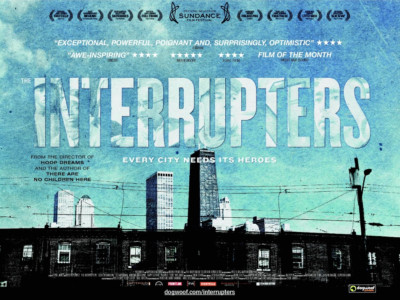UChicago Course Ends with Eye Opening Screening of "The Interrupters"

According to Chicago Police reports, last year there were over 400 homicides in Chicago, approximately half of which were victims under 26 years old. One year earlier in 2009, the city made national news when the story of Derrion Albert's beating death made headlines. Two months prior to his death, CNN aired a special report on "Chicago's Deadly Streets", investigating the cause of violence in the city. The attention the city has received is not desired, but certainly needed. Stories of tragedy can be insights of empathic understanding and warrants for change; however we should recognize that not all actions and events can be explained. It's nearly impossible to imagine that statistically a person dies every day in Chicago from some form of violence. It's even harder to understand the reason why these events occur, but many are trying and are using this understanding to stop cycles of violence.
The Interrupters is a new documentary that bridges the gap between those who do work to address the problem of violence in Chicago and those who want to be informed. The Kartemquin Films produced work has received much praise for its ability to metaphorically pull audiences into what some call the "war zone" of West and South sides Chicago. Filmmakers follow CeaseFire, a Chicago-based violence prevention group which has one goal in mind: to save a life. CeaseFire employs "Interrupters" - themselves ex-offenders - who intervene, mediate and attempt to prevent violent acts from occurring, one incident at a time. Interrupters have lived the life of those they seek to influence, which makes it great strategy in effectively reaching out to their communities. It is through the words and actions of these Interrupters that audiences of the film leave with a better understanding of what CeaseFire calls the disease of violence.
On Wednesday, November 30th, this documentary was screened to a group of University of Chicago students to complement what they had studied over the quarter. Students from Professor Adam Green's "Introduction to Black Chicago" and Senior Lecturer Judy Hoffman's Documentary Production courses were invited to attend. "Introduction to Black Chicago" aims to familiarize students with Black Chicago's history and how that history has created the current state of African American society in the city today. The topic of violence is an important part of this history and the screening intended to enlighten and reinforce points made in their studies.
Gabrielle Newell, a 2nd year in the college and student in "Introduction to Black Chicago", appreciated that the documentary put a lot of what the class discussed in context.
"As we have discussed in Professor Green's class, the circumstances we face today are not merely happenstance", Newell explains. "CeaseFire understands the systemic quality of violence - how it continues and perpetuates itself unless it is stalled - and their broader understanding enables them to do their work effectively."
From this documentary, students can not only empathize with the communities affected, but also gain a deeper understanding of broader issues. Much of the violence shown and talked about in the film occurs on the South Side, sometimes not too far from the University of Chicago's campus. Youth who live in these areas, and are many times the same age as Uchicago students, are subjected to acts of violence unfathomable to many of those who attend the university. These courses and screenings like this allow students to take off their blinders, embrace their neighborhood and extend a hand.
The screening was tied off with a lively panel discussion with
representatives from three important groups in relation to the film.
The panel included:
- The Interrupters' Executive Producer Gordon Quinn, Uchicago alumus and co-founder of
Kartemquin Films.
- Ayoka Samuels, Senior Program Director of Gary Comer
Youth Center, brought more than 20 years of experience working with youth on Chicago's South and West Sides.
- 16-year-old Victoria Crider, representing Fearless
Leading by the Youth (FLY), shared her experiences as a leader working to bring change in the lives of youth in her community.
CeaseFire is an initiative of the University of Illinois Chicago's School of Public Health. Some might view a university's sponsorship of preventive programs as counterintuitive. Though they are given the funding to run great community programs, the residents themselves might resist because of the affiliation to the university, or the program might be hesitant of the university's intentions. The screening for the course shows however that these two organizations can work together. Professor Green believes that exposing the students to their surroundings in this way strikes a great balance between the benefits of both parties. The documentary helps the students place their studies into perspective and gives the community more awareness and possible helping hands.
The University of Chicago is surrounded by communities impacted by these issues of violence and is a part of the discourse. When students open their minds inside the classroom, that may translate into action outside in the community. Whether they are volunteering alongside community residents, doing research to understand and improve community organizations, or engaged as student activists, the dynamic between the community's stories and the university's work shows that it can be a positive relationship.
0 TrackBacks
Listed below are links to blogs that reference this entry: UChicago Course Ends with Eye Opening Screening of "The Interrupters".
TrackBack URL for this entry: https://blogs.uchicago.edu/cgi-bin/mt/mt-tb.cgi/619

Leave a comment